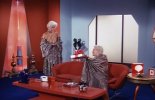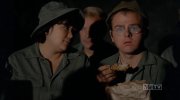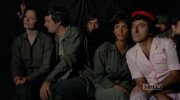Post-50th Anniversary Viewing
All in the Family
"Edith Finds an Old Man"
Originally aired September 29, 1973
Wiki said:
Archie is not happy with Edith allowing a nursing home runaway (Burt Mustin [Who else?]) to stay with them.
Edith brings home 82-year-old Mr. Quigley, who's bearing a suitcase and wearing pajamas under his coat. Mike and Gloria are each surprised at their unannounced guest, who's trying to get in contact with his daughter. Edith tells them how she saw him walking on the street in his PJs while at the market...in her usual overly detailed manner. While Edith's trying to tell Archie after he comes home, he sees Quigley walking out of kitchen. Archie tries to save time by getting the story straight from Quigley, who expresses his dissatisfaction with nursing home life.
Quigley: Suppose you don't want to play bingo every Tuesday?
Edith: You mean they force you to play bingo?
After some further conversation in which Archie displays self-consciousness about his own age, he tries to call Quigley's daughter and, after he explains the situation, she gives him an unheard "Go to hell".
After Quigley has settled in at the Bunkers' (and gotten dressed), Archie wakes up from a nightmare in which he found himself in a situation mirroring Quigley's, which involved Mike and Gloria (whose street signs were all in Polish and who had "two little Meatheads") turning him away. He was then caught in a net, taken back to the home, and forced to play bingo.
Edith: Did you win?
Quigley calls a friend he can stay with to pick him up, and Mike gets into an argument with Archie about how the government isn't doing enough for the elderly--with Archie encouraging him to get a job so he can contribute as a taxpayer. When Quigley's friend arrives, "Joe" turns out to be a Jo (Ruth McDevitt), who plans to stay unmarried so they can both collect full Social Security. Before the couple leaves, Gloria adopts them as foster-grandparents. (Hope they have a safe journey north of the border.)
M*A*S*H
"Radar's Report"
Originally aired September 29, 1973
Frndly said:
Radar chronicles the antics of a typical week at the 4077th, which includes Hawkeye falling for a new nurse, a POW going berserk in the operating room and Klinger seeking a psychiatric discharge.
It's October 1951 and Radar is typing a report for Blake. His account begins with Hawkeye preparing to operate on a butt-wounded enemy prisoner (Derick Shimatsu) while flirting with a new nurse, Lt. Erika Johnson (Joan Van Ark). The prisoner tries to escape, grabbing a scalpel, cutting Erika's arm as she tries to talk him down, and smashing the IV of Trapper's patient, endangering his surgery. Klinger arrives on the scene in full drag with an automatic rifle and subdues the prisoner, but not before having his gown strap cut.
Later Klinger helps himself to Houlihan's hairdryer and Burns nibbles his neck from behind by mistake. Burns and Houlihan go to Blake demanding that the Section 8 that the corporal's been bucking for be granted. Meanwhile, Hawkeye has a date with Erika, and things are going well until he notices her wedding ring.
Major Milton Freedman (Allan Arbus in his first appearance in a recurring role that will span the series, and whose first name will henceforth be Sidney) is brought in from HQ to evaluate Klinger, and is astounded when he meets the corporal. On a subsequent date, Hawkeye confronts Erika and learns that she's wearing her grandmother's ring to fend off wolves; but as things are starting to get interesting, he's called in to help Trapper with his patient, who's suffering complications from the botched surgery. As they're prepping, Houlihan informs them that the patient is dead. Trapper goes into the tent where the prisoner in recovering and approaches his IV threateningly, but Hawkeye follows and brings him to his senses.
Freedman readily supplies Klinger with discharge papers to sign, but they're not for a Section 8, they're to classify him as a homosexual and transvestite. Klinger refuses to sign. Hawkeye has not only suddenly decided that he wants to marry Erika, he's been blabbing about it, but she breaks it to him that she's not ready for marriage, and that she's been reassigned and is leaving for Tokyo the next day. Hawkeye's disappointed, but decides to make the most of their last evening together.
In the coda, Radar gives Blake the report to sign, and he looks it over. What he reads aloud is written in terse, factual jargon.
Jackie Cooper, who directed three Season 1 episodes, seems to have become a regular director for the series this season, having directed this, the premiere, and several others to come.
All in the Family
"Archie and the Kiss"
Originally aired October 6, 1973
Wiki said:
Irene gives Gloria a statue of "The Kiss," which Archie finds filthy.
Edith gives Mike a kiss because it's Henry Mancini's birthday, which she read about in Ed Sullivan's column, and then explains with a roundabout account of the best night she had with Archie. Archie, as usual, comes home in a bad mood. Then Gloria comes home with the Rodin statue, which depicts a nude couple embracing in the titular action. It doesn't help that Archie's introduction to it comes as Mike and Gloria are attempting to recreate the figures' poses. After some arguing with Mike and Gloria about his considering it dirty, he learns that it's from Irene, "the queen of the women's lubrication movement". Then Frank, "the prince of pepperoni," shows up at the door, and is upset to learn that Irene gave the statue to Gloria without asking him. Archie leads him to believe it was a loan and lets him take it back.
Gloria, greatly upset over this, makes a point of ignoring Archie at dinner...where Archie objects to Edith serving potatoes au gratin.
Archie: You know why [the French] lost World War II? 'Cause when the k****s was marchin' into their country, the French was runnin' around naked, puttin' up dirty statues, and throwin' cheese in their potatoes.
At the Lorenzos', Frank gets in an argument with Irene over her not asking him about the statue. In an attempt to make things up to Gloria, Archie brings home a gaudy statue of a topless, ukulele-playing mermaid with a large headdress and a small, embedded clock, which Mike laughs at upon seeing. The Lorenzos visit, Archie shows it off, and they're initially speechless, then holding back laughter. When Gloria comes downstairs and clearly doesn't like it either, Irene intervenes by having Archie give her a present that Irene brought for Gloria, pretending that it's from him--which turns out to be a see-through nightgown. Gloria quickly sees through the ruse, but is touched that Archie bought the statue for her, even though she openly hates it.
In the coda, Archie reads that Sullivan printed a retraction, because he got Mancini's birthday wrong.
M*A*S*H
"For the Good of the Outfit"
Originally aired October 6, 1973
Frndly said:
Hawkeye and Trapper receive high-level flak when they buck the brass to report the "friendly fire" shelling of a South Korean village.
The guys find out they're digging shrapnel out of Korean civilians who were hit by an artillery unit that they deduce was American. They bring it to Blake's attention, and he discourages them from rocking the boat by filing a report. They proceed to fill out a surplus WII form anyway, and try to get Frank to sign it because he was also operating on the casualties, but he disavows any knowledge of the affair. After the form has been submitted, Blake receives a visit from Major Stoner of the IG's office (Frank Aletter). When the colonel takes the major to meet Hawkeye, Pierce is initially defensive, but Stoner, saying that he wants to get to the bottom of the matter, persuades Hawkeye to turn over the evidence he's collected. The guys are later outraged to read a write-up in
Stars and Stripes that the village in question, Taedong, was shelled by an enemy artillery unit.
Hawkeye calls Stoner, who claims that he was surprised at the error in the paper as well, but Hawkeye can tell that it's more BS. Hawkeye tries writing a letter to his father to pull in a favor from their senator, but Radar later informs him that the letter was intercepted at HQ. When Hawkeye threatens to go straight to the press, Blake puts him on restriction and tells him how the Army is rebuilding Taedong with modern amenities; but Hawkeye wants an admission of responsibility, so he has General Clayton called in.
Hawkeye: General, we get the distinct impression that your people have been pouring tons of manure on this whole thing in the hope that something beautiful will grow.
Clayton indicates that he had Stoner reassigned to keep him quiet, and tries to convince the surgeons to play ball, threatening them with the possibility of reassignment to a more front-line unit. Then help arrives from an unlikely source--Burns and Houlihan, having bought Stoner's bull and being out of the loop on more recent developments, come in eager to share credit on the matter, bearing their own evidence. Seeing that the wind is against him, the general offers to print Hawkeye's account of the affair. Trapper and Hawkeye express their gratitude by making out with Hot Lips and chasing Burns around the table, respectively.
In the coda, Hawkeye gets a response from his father that their senator has been indicted for influence peddling.
He was only speaking for the nightmare at hand; he wasn't a precog.
What?! How is that possible?
"Enlightened" younger generations could learn a lot from how politics used to work.
Now there's a cool idea for a sport.

Alas, I couldn't find a good video of just the moment in question; but learned that a championship was named after the dog.


en.wikipedia.org
I certainly remember watching this event. As a history buff, it was exciting to watch something so unprecedented unfold, and it felt like a victory for America, but it was also surprising to hear the graciousness and patriotism and dignity he expressed. Fifty years later, now that it really is history, it's a bit unnerving to see how somebody who was once considered the lowest of the low looks almost noble and wise compared to 90% of the politicians we have today.
As much as he's been vilified by history for how he got there, in the end Nixon went out like the statesman that was his better side. Modern politicians could learn a lot from Nixon, if they were learning types.
As for my first-hand experience, I've probably mentioned it a time or two before, but I first became aware of who/what the president was when my parents were abuzz about how they "finally got the crook". When they explained the president to me, I recall responding, "So he's like a king?" Kings I knew about from storybooks.
In an interesting personal coincidence, this momentous day in American political history was also my sister's eighth birthday.
Indeed. A major shake-up would've defeated the whole purpose of Nixon stepping down.
I remember this, but I haven't heard it in decades. The musical interlude sounds like the Beastie Boys or something at this point.

The song half is credited to "Alice Bowie" on the single, where the full track was split between the two sides. Reportedly the record was widely banned after reaching its peak.
Well, I assumed that because they went to the party together, but I don't know for sure.
Yeah, the beginning of the divorce storyline is a few episodes later.
Where are those prudish network censors when you really need them?
Lucky for you, I can't take screenshots from Freevee.
I have to say that it does not get any more subtle or less one sided. In fact, you may find it obnoxiously preachy at times.
Pity. The left-leaning moderate in me finds it grating how the show wears its bleeding heart on its sleeve.
I'm sure I'm not the only one who used to joke that he should have named himself Buddy Costello.

Then people would think he'd named himself after a comedy duo.










 ) of the ABC Suspense Movie that originally aired October 20, 1973
) of the ABC Suspense Movie that originally aired October 20, 1973




